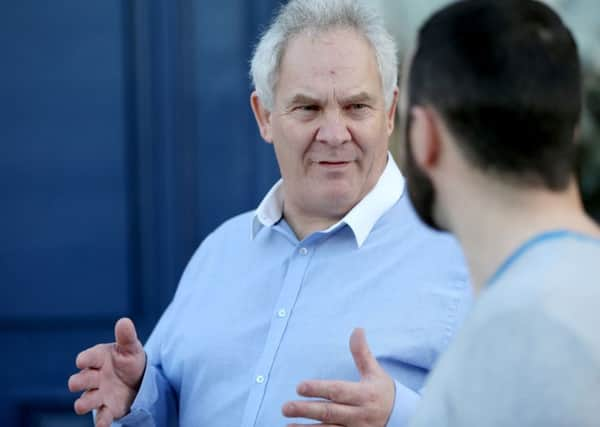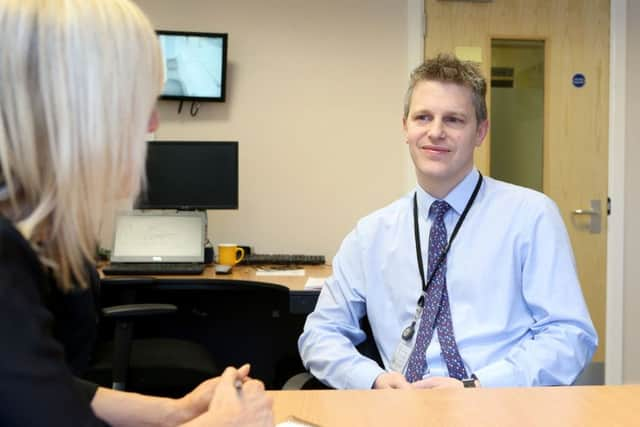Reset and restart: helping offenders find their feet in the community


“If you really want to turn your life around, and you want that help, go for it. Nothing negative will come out of it. If you want to change your life, these are the kinds of programmes that can help you,” he says.
His name is David, and he is 32. He’s also an offender, and spent 10 months in Maghaberry Prison, before beginning a 21 month period out on licence. That’s all the details we are permitted to give you about him, but in reality, his past record isn’t the issue of this article.
Advertisement
Hide AdAdvertisement
Hide AdWhat is are the steps he is taking to turn his life around, seek stability and a means of providing for himself and his family, and one of the ways he is helping himself achieve these goals is through his participation in the Reset programme.


A partnership project introduced by the Probation Board and funded by the Northern Ireland Executive Change Fund, Reset enables people who have served a custodial sentence to be mentored by a person with experience in the field of working with offenders right from the moment they leave prison, for a period of 12 weeks post-release, supporting the work of their probation officer.
Explaining more about the concept of the programme is the Probation Board’s acting assistant director for rural regions Stephen Hamilton.
“We know that the first days and weeks after being released from prison is a critical time in ensuring an offender does not go on to re-offend,” he said. “Research shows that a significant proportion of prisoners released from custody are recalled to prison in the first few weeks of release due to their behaviours, which increase the risk of re-offending. They may have a range of practical problems including, for example, unstable accommodation or unemployment and some may fail to comply with supervision or re-offend in the community.
Advertisement
Hide AdAdvertisement
Hide Ad“We have therefore introduced this project which will enable mentors, employed by our partner NIACRO, to begin work with offenders four weeks prior to release from prison, to meet them at the gate on release and provide intensive support for a maximum of 12 weeks after release.


“Reset specifically targets offenders who are subject to supervision by PBNI on release from prison. We believe it will enhance community safety and ensure there are fewer victims of crime.”
It’s a one year project, but according to Stephen, has already proven successful, with evaluation showing that the “early indications are that the scheme is proving to be effective.”
And he stresses that its benefits are to the wider community, because it is serving to reduce the level of re-offending, as well as being more cost effective to the tax payer. And prison is expensive.
Advertisement
Hide AdAdvertisement
Hide AdOffenders are often recalled to prison if they breach the conditions of the licence imposed on them when they are released. They might be, as Stephen explained, out on licence for a period of say 12 months, and during that time must comply with certain obligations such as meeting their probation officer, taking part in certain programmes, for example domestic violence programmes, and so on. They can also be recalled if they reoffend.
“So there are no real winners in this situation,” said Stephen. “We wanted to try and reduce the number of recalls, and the likelihood of re-offending - this is what Probation is about, and Reset helps with this.”
As he went on to explain, whilst a probation officer, when supervising an offender, has responsibilities relating to them, does not have the time to help them in other, often more practical, ways, such as, for example, accompanying them to collect their benefits, or to the job training centre and so on.
“So the Reset scheme fills in the gaps and helps them to be citizens first, and rehabilitated back into the community.”
Advertisement
Hide AdAdvertisement
Hide AdAfter coming up with the concept last January, the Board had to apply for funding, and found out the following month that they had been successful in their bid.
The contract to provide the mentoring service was awarded to NIACRO, an organisation based within the voluntary sector, with a long history of working with offenders.
Each mentor looks after a small group of mentees, who are 18 and over and classified as “medium and high risk people.” It’s a role that requires certain specialist skills; I’m due to meet one mentor, William Armstrong, a man who Stephen tells me possesses all the qualities needed.
“A mentor has to be able to see the person he is mentoring as a citizen and not just an offender. He has to see him as somebody who has hope for changing.”
Advertisement
Hide AdAdvertisement
Hide AdEx-offender David is one of those people. Describing being sent to prison as a “big wake up call”, he took steps as soon as he was in there to try and turn his life around, completing courses, and even passing his lorry test before he went in.
“I went down a road that I shouldn’t have, I had a lot of issues in my life,” he says.
“For me the jail time wasn’t the issue - it was the people I was leaving behind. It is the hurt that they are going through. So when I was in Maghaberry I made good use of my time. I took the steps I needed to so I could have a better life when I came out. My main concern was getting a job when I came out. I knew I needed stability in my life.”
When David learned about the Reset scheme, he said something about it really appealed to him, in spite of negativity shown by other inmates towards it.
Advertisement
Hide AdAdvertisement
Hide Ad“The girl put me on to William directly and he came and saw me. He seemed like a really positive guy, and I could relate to him. He was just really down to earth and on my level. I got a really positive vibe from him.”
William has helped David in so many ways since his release, from practical things, like putting him in touch with an organisation that can help him work on his CV, or giving him a lift if he needs one, to just being a listening ear, and linking back to his Probation Officer, to complete the process. It’s good to know that you can just lift the phone and have a positive conversation with someone to give you a lift if you are feeling down.”
David is full of nothing but praise for the work that William and other Probation staff do.
But he stresses that mentees need to really need to “want to change” in order to feel the benefits of the scheme.
Advertisement
Hide AdAdvertisement
Hide Ad“People can offer you all the help you want, but if you’re not willing to get there and take the chance and make those decisions yourself, it’s just not going to work.
“You need to think positive, and if you have positive people around you reassuring you, then that’s a big thing. That was what drew me to Reset.”